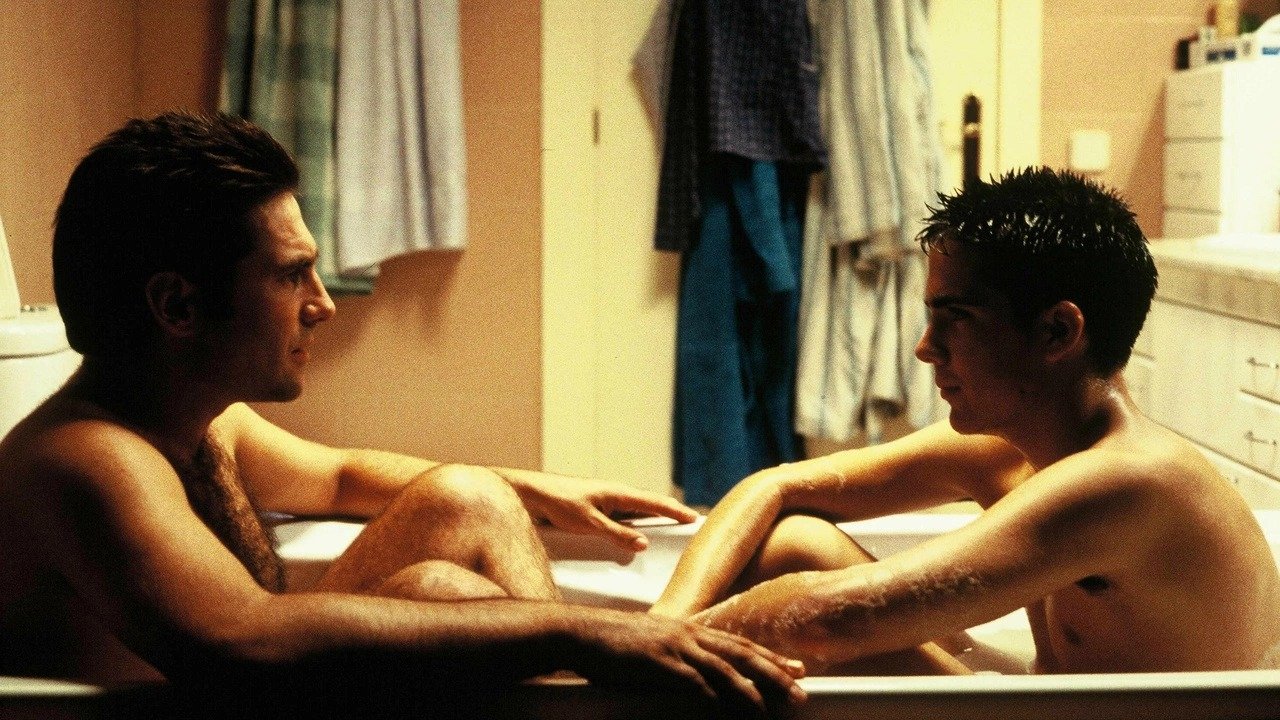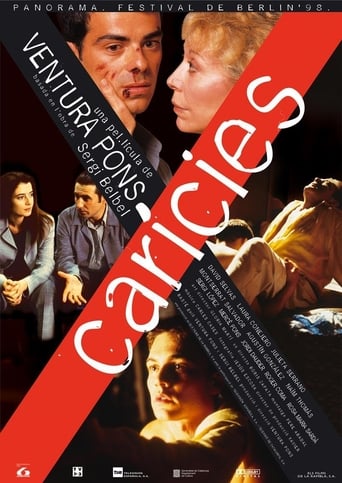Lovesusti
The Worst Film Ever
SpuffyWeb
Sadly Over-hyped
Kidskycom
It's funny watching the elements come together in this complicated scam. On one hand, the set-up isn't quite as complex as it seems, but there's an easy sense of fun in every exchange.
Sarita Rafferty
There are moments that feel comical, some horrific, and some downright inspiring but the tonal shifts hardly matter as the end results come to a film that's perfect for this time.
Jon
Well, Spanish cinema does tend to the weird (think Almodovar), and Ventura Pons' Caresses is no exception, though it's a bit more down-to-earth than El Mar. The closest well-known American movie to compare it to would be Magnolia. According to "A Course in Miracles," Everything is either love, or a desperate cry for it. Caresses is definitely in the "desperate cry" category. It consists of 11 very distinct two-person conversations in which the dominant character from the previous scene becomes the non-dominant character in the next. The first three scenes are marked by shocking, unmitigated hatred, and each is a painting of tremendous emotional dissatisfaction. Most are downright disturbing. Furthermore, although each conversation is presented as though it's happening straightforwardly, each is unsettling, surreal, and wildly improbable. The characters usually talk past each other as though they can't even hear the other. On only a few occasions does the listener even respond to the talker. My interpretation is that none of the conversations is real, but we are hearing what the characters WANT to express to each other, but don't, such as what the teen-age junkie wants to say to the homeless man he robs, or what the man would want to communicate to him. Regardless of whether any of the dialog is imaginary, Caresses undoubtedly focuses on bringing the "Shadow" into the light... uncomfortable for most of us, and hence the negative reviews.I can't give it a positive review either. The acting is erratic, the motivation of the characters incomprehensible. Most of the movie is downright painful to watch. Furthermore,the actors seem to be playing such different roles in their two scenes, it's almost impossible to see them as playing the same character in different circumstances.Maybe it have worked if Pons had amplified the surrealism and used dream sequences to show us we're looking at the hidden parts of the characters. Or maybe not. At any rate, like a few other Catalan films I've seen (Morir O No, and El Mar), I find it mostly interesting for studying that fascinating language. And unlike El Mar, these conversations takes place in colloquial Catalan in the Barcelona dialect... But God forbid you would say phrases like these when you visit there!
xispas87
"Carícies" claims to be an adaptation of a famous catalan theatre play by Sergi Belbel. Once seen the film, and also read the play, I can't believe how much successful the film was. The critics loved it and I wonder why. Director Ventura Pons has found the phormula for instant success: filming an acclaimed play or book (as he did in "El perquè de tot plegat/ El porqué de las cosas", "Actrius"...). Motion pictures are suposed to be an art, not just a book or a famous play shot in 35 mm. In "Carícies", director Ventura Pons, uses the dialogues of the play almost word by word and his job consists on add music and a few continuity shots inserted among each scene. The plot (if there's is any) is very weak, as often occurs when adapting a character-based play. That's the case. And that's the problem. Pons is surrounded by few good actors but they seem undirected, and they act on their way. There is no sense of direction anywhere. No intentions, not a single idea on the screen. Ventura Pons is a smart producer but unoperative as a story-teller. "Carícies" has no soul, no blood. Just filmed words. And for me, this is not cinema.
bob wolf
It has always struck me as odd why certain films are deemed worthy of praise while others are considered dreck not worthy of even a review. Carícies ranks as one of those "praise-worthy" arthouse films that gets airtime on such high calibre stations as Bravo and Showcase. But why?
A group of interlocking stories, connected by a character who interacts with a character from a previous story, fill out this two hour ramble of human misery.Unless you've seen Carícies you would not begin to believe how low, morally, a film can sink. The film, quite literally, opens with a man violently assaulting his wife, then incredibly, it gets worse. Each little story is filled with one character physically or emotionally assaulting another character. And for no reason. The only real moment of reprieve from all this pain and anger comes when a man attempts to tell his ex-girlfriend about her hygiene problem. I admit I laughed but even that didn't feel right, it was at the characters expense. I felt like a bully after the scene had played itself out.Carícies might be considered intelligent, artful cinema or whatever, but I'd rather watch Up The Creek any day. I'd much rather spend two hours in a sea of bad dialogue and silly humor rather than wallowing around in two hours of characters hurting each other for the sake of art.
dequesi
When I saw this film, most of the people in the room just hated it. Why?Well, "Caresses" is a play on screen. Hollywood is galaxies away. And so is Broadway."Caresses" is made up of a series of dialogues. The tense relationship between two characters (lovers, relatives...) gets to a breaking point and the audience are witnesses of the crisis. The scene ends and an interlude of fast-forwarded images of Barcelona at night takes us and one of the characters to the next encounter.Most people considered all this quite repetitive, meaningless, and boring.In my opinion, the combination of these apparently unconnected scenes is a deep, moving analysis of life in the city, of love relationships in the nineties, and most of all, on loneliness - lack of love, and search for tenderness.Love it or hate it, this film is conceptually very simple, but indeed very different to anything you've seen before.

